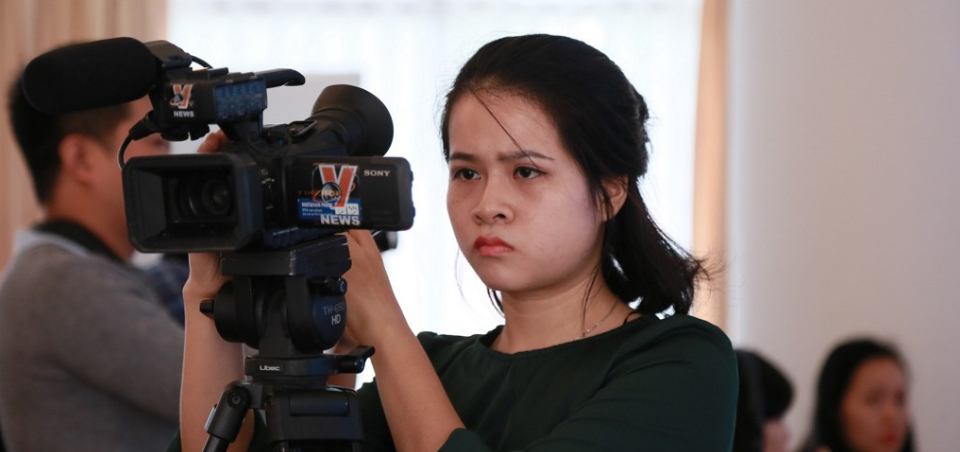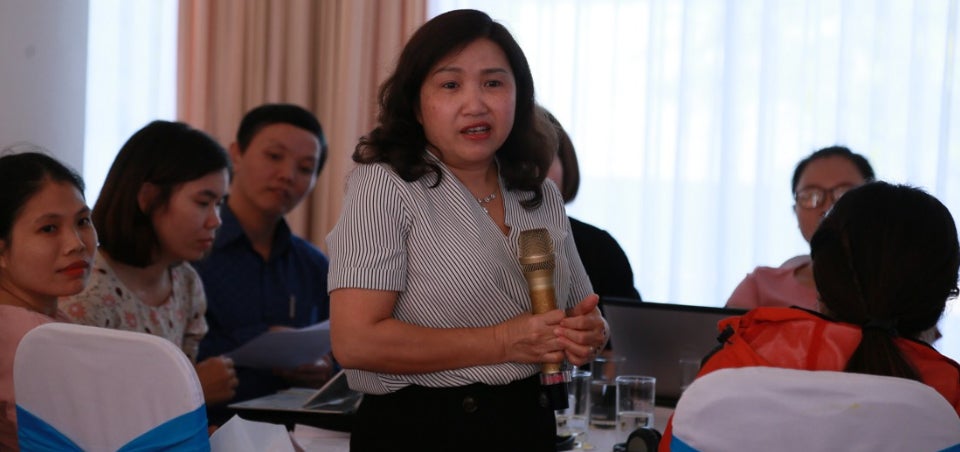Viet Nam’s journalists learn how to report on women and risks of climate change
Date:
Author: Prashanti Subramanian

Hue, Viet Nam — Two dozen Vietnamese journalists are now able to better report on how women can help prepare for and mitigate the effects of natural disasters, thanks to a training co-organized by UN Women.
Empower Women for Climate-Resilient Societies, a joint project UN Women and United Nations Environment Programme, collaborated with the Viet Nam Disaster Management Authority in organizing the training last November 21-22 in this city in central Viet Nam. A total of 26 print, broadcast, digital and photo journalists from 17 media outlets attended.
The trainers – UN Women Viet Nam staff members and local and foreign journalists – discussed topics including the connections between gender equality and climate change and disaster risk reduction; how journalists should report on these issues; and how they should make use of climate data and national surveys.
They led the trainees in using storytelling methods, and climate and disaster data, and in role play and field visits.
Nguyen Truong Son, Deputy Director of the Viet Nam Disaster Management Authority, told the workshop participants: “If we are all to collectively rise to tackle the climate crisis, the role of public and private media is critical. Narratives matter and stories can help people empathize with others more vulnerable than them and make sense of the complexity of an issue like climate change and disasters.”
“Often, vulnerable women and children become the faces of natural disasters in media reportage,” he said. “While it is important to shine a light on this vulnerability, women and girls are also dynamic agents of change, spearheading preparedness efforts, disaster risk reduction and recovery and rebuilding.”
Xuan Long, a reporter from the state-run Voice of Viet Nam radio station, said journalists normally don’t get any instruction on how to report on climate and disasters, let alone on how they involve women.
“This has made us reflect on the challenges -- how do we not reinforce stereotypes and how do we cut back on shocking imagery and continue to bring the emotion and the seriousness of the situation to the readers,” he said.

Van Nhue, from Ha Noi Moi Newspaper, said: “Often, relevant knowledge is available but not being reported or disseminated to the public. The training was very helpful for us to learn new skills to translate the data into simple, easy-to-understand language and disseminate gender-responsive reports to the public.”
Duong Huong from Viet Nam National Television said female journalists like herself also had particular concerns.
“Journalists are also affected by disasters and victims, so the issue of female journalists’ safety during disaster reporting is also important,” she said.
Elisa Fernandez Saenz, UN Women Head of Office in Viet Nam, said it was crucial for the media to make concerted efforts, before disasters strike, to promote more public awareness climate change and preparedness and in particular, to amplify women’s voices on the issue.
Inkar Kadyrzhanova, Project Manager for EmPower at UN Women, said: “From shaping public opinion about the crisis to informing average citizens about what they can do and keeping governments and private sector players accountable, we have seen media reportage make a dent by bringing the climate emergency straight into our living rooms and to our phones and social media feeds.”
With funding from Swedish Development Cooperation Agency, EmPower is opening up more opportunities for women in communities, civil society groups and governments to participate in climate and disaster risk reduction policymaking. EmPower will work in Viet Nam until 2022 with the Viet Nam Disaster Management Authority, Viet Nam Women’s Union and Ministry of Agriculture and Rural Development.